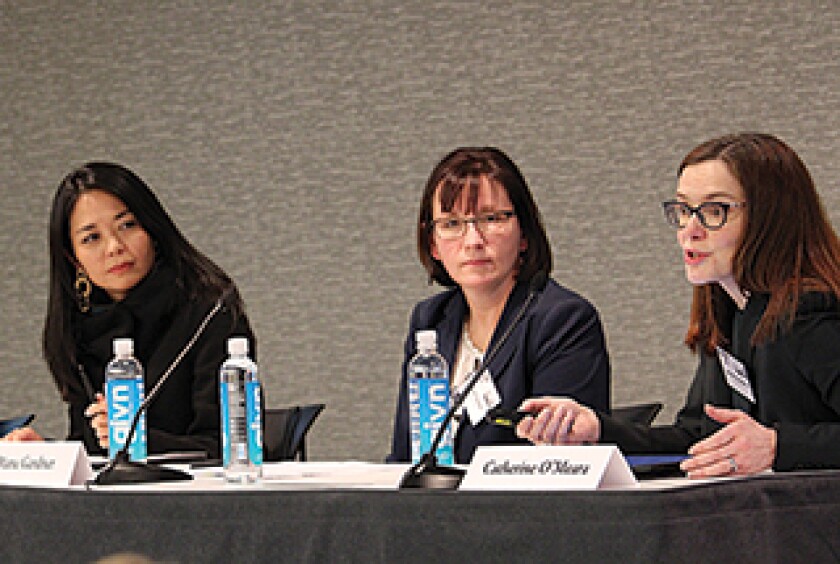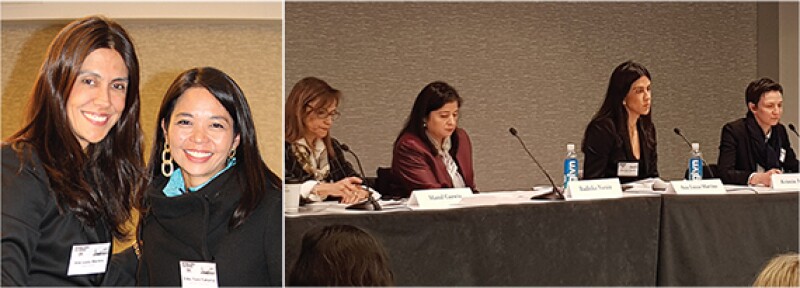
This year's theme for International Women's Day on March 8 was "Press for Progress", an initiative that strives for gender parity and inclusiveness at a time when the World Economic Forum's 2017 Global Gender Gap Report says gender pay parity is more than 200 years away. But, on the bright side, 2018 is also the year celebrating the centenary of the UK Representation of the People Act, when some women got the vote for the first time. A lot of progress has been made since then, and the world of tax is no different.
ITR's interactive one-day forum focused on US and global tax and transfer pricing developments, with women from across the Americas and Europe sharing their expertise. Topics ranged from the US Tax Cuts and Jobs Act of 2017 to building an effective corporate tax department, ethics, and how to develop your career.
This opportunity to network and learn from industry thought leaders was attended by more than 100 men and women.
US tax reform
When ITR began planning its first Women in Tax event, US tax reform was just one of President Donald Trump's ambitious proposals in his economic plan. Fast forward 11 months from his inauguration and tax reform has been enacted. This overhaul of the country's tax code is on the mind of every international tax professional. With the new rules affecting the 2017 financial statements of companies operating in the US, the need to understand the changes is immediate.
|
|
I loved the format of the forum. The panel discussions with an open conversation was fluid and kept me engaged throughout each session. Overall, all panellists were well spoken and added value to each topic discussed |
|
|
Kristin Mikolaitis, tax controversy and litigation partner at Mayer Brown in New York, opened the forum with a look at this big change. She was joined by her colleague Ana Luiza Martins, tax controversy partner in Sao Paulo, and Manal Corwin, national leader for international tax at KPMG in the US. Offering her perspective, Radhika Narain, vice president of international tax at News Corp in New York, was also on the panel.
Besides a run through of the key measures affecting multinationals, the leaders shared their views on whether the US has actually moved to a territorial system – one panellist said she believes the US continues to operate on a worldwide tax system – and how some of the provisions can be interpreted.
Although the alternative minimum tax has been eliminated under the new rules, the base erosion and anti-abuse tax (BEAT) is causing some concerns as a limited scope alternative minimum tax, the women said.
US and foreign companies are subject to the BEAT, which will apply to certain deductible "base erosion payments" made to related foreign companies. The rate charged will increase over the years as follows:
5% for tax years beginning in 2018;
10% for tax years beginning in 2019-2025; and
12.5% thereafter.
However, the panellists reassured the audience that not all companies will need to worry about the BEAT, as it applies to taxpayers with average annual gross receipts over a three-year period of at least $500 million and a base erosion percentage for the taxable year of at least 3% (2% for certain financials).
The women warned, however, that in the case of an M&A transaction, the purchasing company should be mindful of the BEAT threshold when combining receipts with its acquired company.
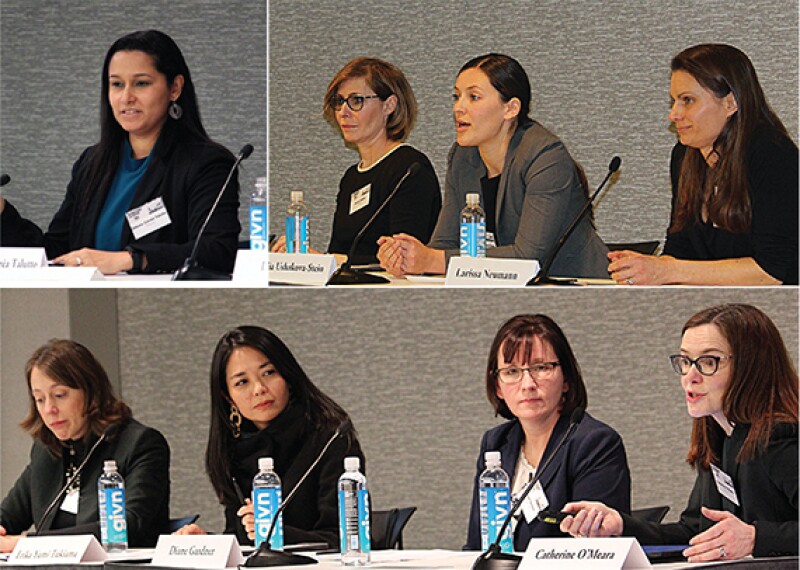
Taxpayers will need to determine which payments may be considered as "base erosion payments" under the BEAT, the panellists said.
The BEAT is not the only cause for concern. Section 951A, on the tax on global intangible low-taxed income (GILTI), is a complicated matter.
The GILTI imposes a minimum US tax on the income derived by a US shareholder's controlled foreign corporations (CFCs). In applying the GILTI provision, a US shareholder must go through subpart F, expense allocation, the foreign tax credit regime and, therefore, earnings and profits computations.
The GILTI applies to CFCs for tax years beginning after December 31 2017. US shareholders must include as income all non-exempt and non-subpart F income annually as GILTI for the taxable year.
Mikolaitis and her fellow panellists noted, however, that deductions are available. A US company can deduct up to 50% of the GILTI included in gross income for tax years beginning before December 31 2025. Thereafter, a company can deduct up to 37.5% of its foreign-derived intangible income (FDII) for the taxable year.
What taxpayers want now is guidance. It is inevitable that the Internal Revenue Service (IRS) will provide some guidance on the provisions, but there is no timeline for when this may happen (see this month's cover story on page 18). Some practitioners expect guidance on the GILTI to come first, in the coming weeks. However, the panellists believe this guidance will predominantly take the form of regulations.
But the issuance of guidance could be stalled because of resource constraints in the IRS, as well as personnel changes, and questions about the role of the Ombudsman in reviewing regulations.
With so much uncertainty comes risk. Without guidance, taxpayers may be forced to make an educated guess when implementing certain provisions. However, this could lead the IRS to question their approaches. Taxpayers need to be prepared to defend their positions should an audit arise and be prepared to deal with any subsequent penalties, the panel said.
Tax controversy won't stop with just the IRS, however. Taxpayers in the US need to consider the tax consequences of the new international provisions in foreign jurisdictions, as early reactions from the OECD, EU and the US's treaty partners are mixed. The panel also anticipates some challenges from the World Trade Organisation.
Managing your disputes
With US tax reform posing more risks of tax controversy, managing tax and transfer pricing disputes was what attendees to the forum needed to know.
Larissa Neumann, tax partner at Fenwick & West, chaired a panel on this with her colleague Julia Ushakova-Stein, a tax attorney. They were joined by Lucia Fedina, transfer pricing director at CBRE, and Débora Corréa Talutto, senior global transfer pricing manager at Temenos.
Most taxpayers would agree that documentation is important evidence in audit situations.
To prevent transfer pricing audits, however, companies should be "transaction specific" and "detailed" in their documentation, which should be in line with their financial statements, said the panel.
To tell a "compelling story", it is important to build a file containing written inter-company agreements, interviews with prospective employees and their agreements with the company (if appointed), meeting agendas, logs that detail progress and workings, and contemporaneous transfer pricing reports.
These reports should describe the transaction and relevant functional information, select the best method to test the transaction, and support that the transaction is at arm's length.
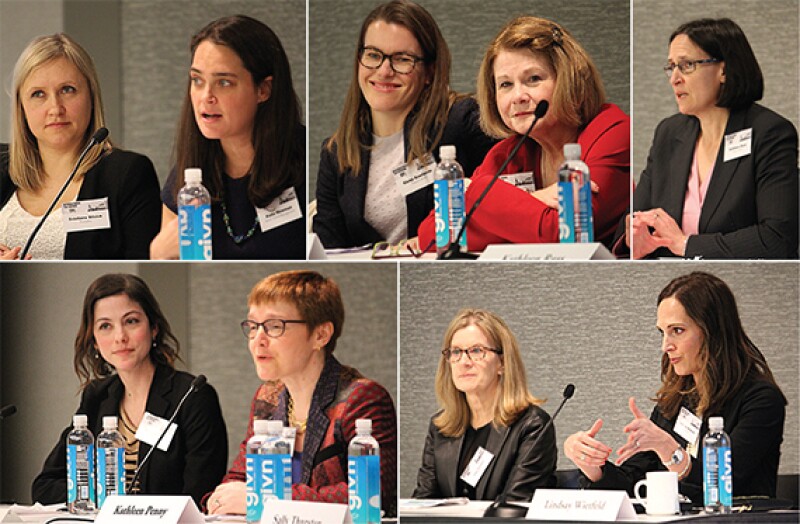
Transactional agreements should describe the terms of the transaction, document that the legal entities agreed to the terms and, similar to TP reports, ensure there is supporting evidence to prove the transaction is at arm's length.
No matter what approach a company takes, it is important to be consistent. To avoid appearing inconsistent, companies should ensure only final documents are included in audit files, while draft versions are stored elsewhere.
The onset of country-by-country reporting (CbCR) in line with BEPS Action 13 makes the need for a consistent approach even more important. But the panellists warned that while a policy is required on these documents, some thought should be given to local country requirements for master and local files, such as India. Preparing CbC reports for tax authorities is not enough, however. Although public CbCR has not yet been enacted, these reports should be prepared with tax transparency in mind. The likelihood of public CbCR has grown in recent years and companies need to be prepared in case it becomes a reality.
These preparations are just some of the steps companies are taking to get ready for the post-BEPS era.
|
|
Great conference! Adding the ‘softer’ issues made it so very interesting |
|
|
Catherine O'Meara, tax partner at Matheson, led a panel examining the challenges and opportunities of the 'post-BEPS world'. Along with her co-panellists Diane Gardner, vice president of tax and treasury at Kodak Alaris, Margriet Lukkien, tax partner at Loyens & Loeff, and Erika Yumi Tukiama, partner of direct tax at Machado Associados, O'Meara reviewed the changing landscape.
On the agenda was the global implementation of the BEPS action points, the OECD report on digital taxation, and the impact of transfer pricing on financial transactions. On the topic of the EU, the panel discussed the Anti-Tax Avoidance Directive (ATAD), CFC rules, general anti-avoidance provisions, tax rules to tackle hybrid mismatches and the unilateral measures some countries are taking. The topics of state aid cases and the common consolidated corporate tax base (CCCTB) were also discussed.
The ATAD will be mostly effective from January 1 2020 once member states have transposed it into domestic legislation. However, certain provisions on hybrid mismatches will be only be phased in as late as January 1 2022.
Next to US tax reform, the ATAD will lead to the clean-up of many corporate structures, such as CV-BV structures, within the next few years, according to Pieter Frolichs, senior associate at Atlas Tax Lawyers.
But it is the CCCTB and Brexit concerns that are looming. While the French government supports taxing the revenue of tech companies rather than their profits, in order to make tax avoidance much more difficult, the German government believes the CCCTB is the way of taxing the profits of online businesses. With the new German coalition in place, the proposals for a CCCTB will stay firmly on the EU agenda – even if Ireland disagrees.
The UK's anticipated departure from the EU also poses its own risks for taxpayers, as noted by the panel. The move poses questions on trade, tax and employment, but it is also unilateral measures such as the diverted profits tax that continue to create headaches.
What kind of leader are you?
While six of the eight sessions at the forum where focused on technical tax matters, it was a panel chaired by Kathleen Russ, tax partner at Travers Smith, that took the spotlight.
Russ, alongside her colleague Elena Rowlands, a tax partner, as well as Katie Newman, senior tax counsel at Apollo Global Management, Nancy Nelson, tax director at Interactive Brokers, and Sviatlana Bitsiuk, a tax director at Prometric, shared their experiences of tax leadership.
In this panel, and a later session on working your way to a chair at the boardroom table, there was advice on embracing influence, power and running a successful tax department, as well as finding your leadership style and becoming a powerful champion and supporter of other women.
Women on the panel and throughout the room shared their experiences of balancing a challenging job with personal aspirations and responsibilities.
How do you manage your job and have a family when they both conflict? "You make yourself irreplaceable," one woman said. "If you are highly valued by your company, they will find a way to support you," said another.
Taking ownership of your career was a key theme of advice.
Also, having a mentor, whether in your organisation or outside, can provide you with the tools necessary to deal with such circumstances. If the mentor is in the same industry, they are likely to be able to relate to your situation.
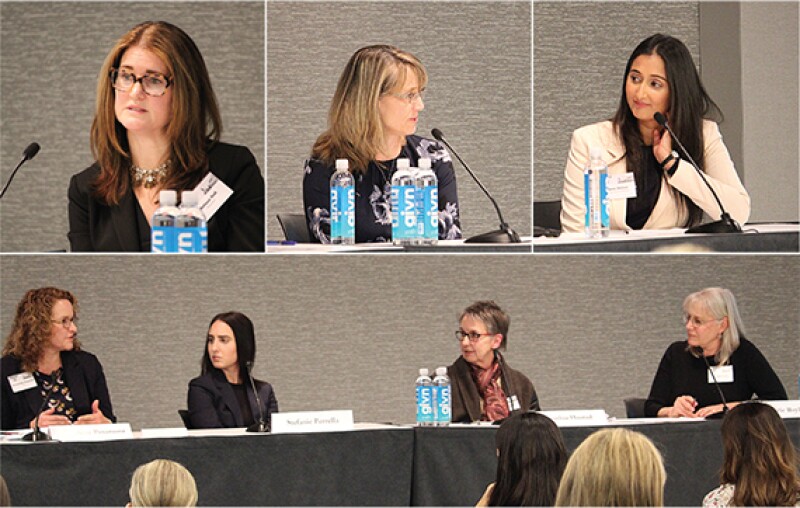
Genevieve Moore, partner and head of corporate tax at Blick Rothenberg, recommends that any aspiring businesswomen seek advice, mentoring and coaching from their role models, whether they be women or men. "Whilst I have benefited hugely from working with many inspiring and talented females, it is the coaching and mentoring from our current (male) CEO that has really enabled me to grow and strive to reach my full potential," she said in a recent article published on the firm's website.
Fiona Fernie, tax risk and dispute resolution partner at the same firm, said: "My advice to young women would be to determine their goals early on, believe in themselves and what they have to offer, find someone influential who will mentor and help them, and then work with dedication towards achieving that goal."
Ultimately, the advice to young tax professionals was to determine which aspects of their jobs they really love and find a role that allows them to succeed in that area.
For those taking on leadership roles, the advice was to not to try to be a man. Be yourself, and tailor your management style to your personality and the needs of your team and business.
"People were scared to come to talk to me," said one panellist. "Apparently, I was viewed as unfriendly and stern," said another.
|
|
[I liked] being in a room full of strong business women and hearing about their experiences |
|
|
So what's caused this? "I felt like I had to be more firm because I was a women leading the team. Men don't have that problem," said one forum attendee. Another said they couldn't find the right balance between being someone's boss when they were previously their equal and their friend.
But you need to find your own approach, the panellists responded. Advice was shared across the room on how to adapt, with many individuals at the forum saying it takes time to find your style.
Jo Maughan, who left the tax profession in 2014 to become a career and leadership coach to tax and finance professionals, sums it up well in a recent article written by Reshma Johar in the Taxation Journal. "It is easy to focus on developing skills but it is essential to build self-awareness to progress – use judgment, influence, networks and relationships. It is not just about whether you can do the job, it is more [about] whether you can persuade people to believe that you are the right person to lead an area. Think about the impact you have on others and, more importantly, the impact they have on you. Each of us has learned to behave in a particular way and it is about unpicking these behaviours to become more influential."
Working your way to a chair at the boardroom table is difficult for women, but the opportunities are growing. Many of the attendees of ITR's Women in Tax Forum are leaders in their fields and highly regarded by their peers – both male and female.
This year's International Women's Day campaign may focus on gender parity and inclusiveness, but ITR's Women in Tax Forum showed how the tax sector is embracing women as leaders and succeeding in developing some brilliant individuals.

